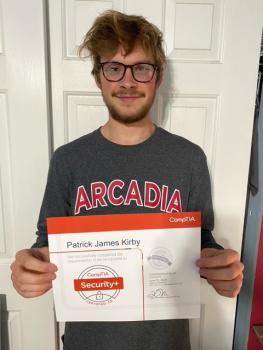Computer Science Helps Students Build Resume with Security Plus Certificate

Assistant Professor of Computer Science Dr. Vitaly Ford teamed up with Sabre Systems, Inc., and the Urban League of Philadelphia to allow students to obtain skills and qualifications that will give them an edge when applying to professional positions in the cybersecurity and technology fields.
In collaboration with Deb Kliman ’95, vice president of Human Resources for Sabre Systems, Inc., and Hoa Pham, director of Workforce Development at the Urban League of Philadelphia, 20 students in Dr. Ford’s spring 2020 cybersecurity course sat for the Security Plus Certification exam, which is considered to be an advanced qualification—and one not usually held by students. While Dr. Ford worked with students to prepare for the exam through tailored lesson plans, Kliman and Pham covered the $350 exam cost per student.
“My curriculum aligns with what Security Plus typically requires,” said Dr. Ford. “I thought it would be a great fit.”
Even with the spring semester being upended by the move to online coursework in March, Dr. Ford said students were still learning about network security and exploring how it works. He said what made this collaboration so successful is that students have the opportunity to practice network security theory in the safety of a classroom, and they’re not relying on reading about it alone in preparation for the Security Plus Certificate exam.
“I was a little nervous because I was a first-year student,” said Computer Science and Pre-Engineering major Patrick Kirby, who was one of the only first-year Arcadia students to pass the exam. “I took the exam several weeks after the semester had ended, so I was surprised by how much I could remember but I think that speaks to what a good teacher Dr. Ford is and how a lot that he talked about really stuck with me.”
With the pandemic forcing everything online, Kirby took the exam from his home under strict guidelines. He recalls being required to have his camera on throughout the three-hour exam, with his entire workspace visible. He could only have a glass of water on the workspace with him. In addition, he had to be in a room alone for the exam; if someone walked in, he would have automatically failed.
“Some of the students failed out because of those restrictions, because it’s difficult, especially if you live in a one or two bedroom apartment,” said Dr. Ford, noting that about half of the students passed the exam. “They’re very strict about it during normal circumstances when you would go to the offices in Philadelphia. Now everybody was doing it online.”
Kirby hopes his new certificate will give him an edge in the IT field for internships. He’ll need to retake the exam in three years if he hopes to maintain his certification.

